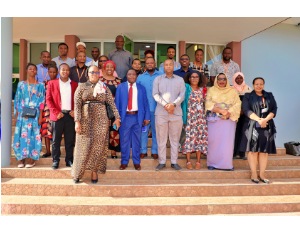Stakeholders want SADC parliamentary forum to identify major priority issues
CIVIL society organizations (CSOs) have called on the Southern African Development Community (SADC) Parliamentary Forum and its thematic committee in Tanzania to prioritise issues of health, agriculture and food security in their commitments for the region’s sustainable development.
The stakeholders also urge the SADC parliamentarians to strongly push for the formation of Agroecology policy and strategy in the region so as to promote massive production of organic food thus strengthen food security and nutrition.
Speaking during the meeting that brought together Tanzanian SADC parliamentarians, CSOs, youth and other stakeholders on Thursday here, Irene Ngao, advocacy officer at the Eastern and Southern Africa Small Scale Farmers Forum (ESAFF) urged SADC member States to fulfil 7 Malabo commitments and allocate progressively, timely at least 10 percent of national budgets to support agroecology, youth and women.
She noted that to achieve its vision 2050, that envision a peaceful, inclusive, competitive, middle- to high-income industrialised region, where all citizens enjoy sustainable economic well-being, justice and freedom, SADC member states have a huge role to play in ensuring strong food security as well as the health of their people.
She further said that Tanzania need to operationalize the Agriculture Development Fund (ADF) by setting aside $120 million as approved by SADC member countries so as to enable the Fund to play crucial role as a source of capital and providing financial services tailored to the needs of small-scale farmers, such as affordable loans, grants, and technical assistance
Abdallah Mkindi, programme coordinator at the Tanzania Alliance for Biodiversity (TABIO) said: “We also urge for the Development of SADC Regional Agriculture Extension Strategy (2024), to support agroecology approaches at scale as well as SADC review Biennial Review Report (PBR) to accommodate Farmer Managed Seed System (FMSS)-indigenous nutrition seeds and plants.” he said.
He called for allocation of enough extension officers to all villages, as per national standard and provision of quality extension services to assist women smallholder farmers in the areas including agroecology
“We also call for increased investment in research to develop agroecological approaches,” he added.
The stakeholders also called for speed up transformation of SADC PF to Parliament with full legislative power as well as enhanced linkages between SADC Parliament and National Parliament could allocate one day in a year to receive and discuss issues from Regional Parliaments.
SADC Member States should adopt a gender based right to food and nutrition framework in all future policies and strategies.”
The CSOs also wanted Tanzania to increase funding to research for indigenous nutrition seeds and plants and agroecology to comply with Malabo Commitment 4 requirement of 1percent of the budget to agriculture research).
Samwel Mkwatwa, from ActionAid Tanzania said they are currently implementing a project on “Strengthening Social Accountability and Oversight Capacity for Rights-based Public Resources Management in Health and Agriculture in Southern Africa”.
This project focused on public resource management (PRM). The project seeks to improve public service delivery in agriculture (food security), and health (HIV/ AIDS, sexual and reproductive health, and rights) by strengthening the oversight and social accountability roles of five target groups in the SADC region, specifically: selected parliamentary committees, relevant government departments, issue-based civil society organizations (CSOs), smallholder farmers organizations, adolescents/youths, and the media,” he said.
He said the project implementation in Tanzania, particularly in Kilosa and Mbozi, has achieved several outcomes which include establishment of smallholder women farmers (SHWFs) forums from village, ward to district level.
Others are establishment of demo plots for agroecological farming in all the project villages, influence and budget increase to support agriculture in Kilosa and Mbozi districts, specifically on extension services and increased number of extension workers (eight in Mbozi and 7 in Kilosa).
“Mainstreaming of agroecology in Kilosa and Mbozi farmers and local governments, mainstreaming of smallholder women farmers issues in the districts and establishment of youths and adolescents’ clubs in both Kilosa and Mbozi
News article: Getrude Mbago (The Guardian)























